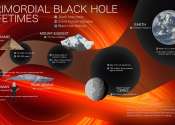High-resolution simulations provide new insights into how galaxies are formed
Astronomers can use supercomputers to simulate the formation of galaxies from the Big Bang 13.8 billion years ago to the present day. But there are a number of sources of error. An international research team, led by researchers ...









